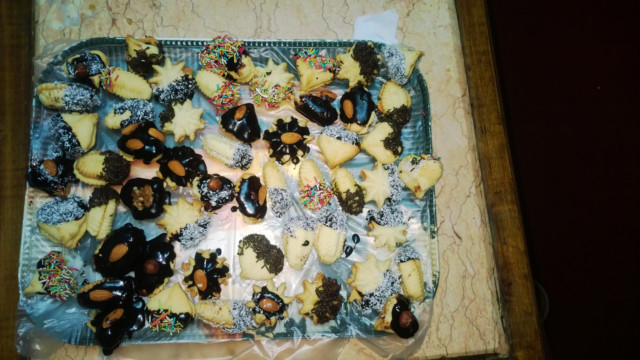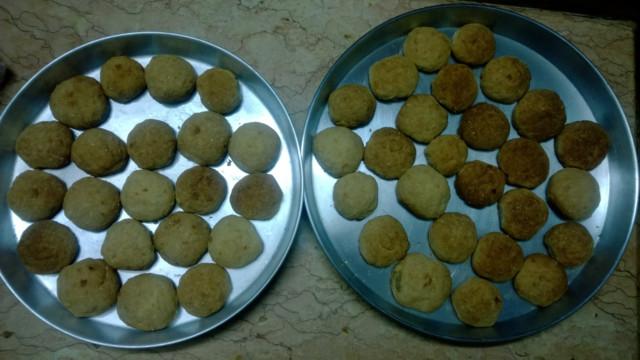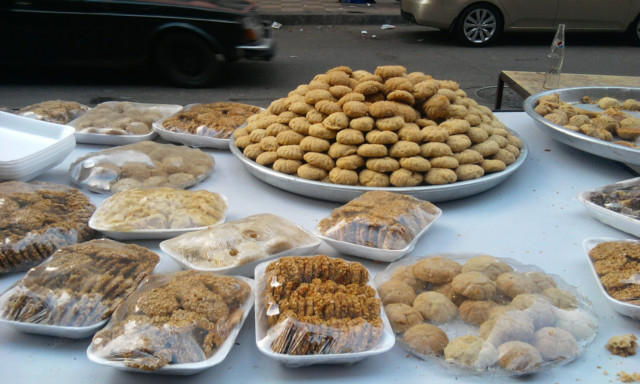
Cairo: Faced with a spike in prices of festive cookies, a dessert long associated with the Eid Al Fitr, many Egyptian families have opted this year to either bake the sweets at home or cut down on quantities bought at shops.
“For many years, I used to buy khah (cookies) to serve them during the Eid to relatives and friends visiting us on this occasion,” said Ashgan Mufeed, a mother of five. “This year, I was surprised to find prices of khak and other Eid sweets soaring. They have become as highly expensive as meat. Therefore, I decided to buy ingredients of khak and cook them at home using the oven of my gas cooker. This has cut the cost by almost 50 per cent compared to the market prices,” she said. “Although the quality is not as high as that of khak bought from shops, at least the Eid will not pass without my family eating it.”
For Egyptians, Eid Al Fitr, which that marks the end of Ramadan, is not complete without cookies. No wonder, the occasion is called “Eid Al khak”.
In the run-up to Eid Al Fitr holiday, which started Monday in Egypt, pastry shops provide a large supply of cookies and biscuits to celebrate the major feast. However, traders admit that increases in prices of the festive desserts have battered their seasonal business.
“Our sales have dropped by around 40 per cent compared to previous years,” said Salah Abdul Shakur, an owner of a pastry store in northern Cairo. “This is unprecedented,” he added grimly.
Abdul Shakur attributed the slump to the rising costs of living in the country in recent months. “People are financially exhausted especially after the rises in prices of petrol and electricity. This has ruined a season that we impatiently waited.”
Earlier this month, the Egyptian government dramatically increased prices of fuel products, heavily cutting decades-old state subsidies on energy. President Abdul Fattah Al Sissi said the measure was unavoidable in order to rein in a staggering budget deficit and revive the economy hammered by more than three years of turmoil.
Salah Al Abd, the head of the Confectioners Section at the Cairo Chamber of Commerce, said that prices of Eid cookies have increased by nearly 20 per cent this year.
“This is due to rises in prices of ingredients used in manufacturing cookies,” he said in press remarks. “Dealers in Eid sweets, mainly cookies, have tried very much to keep prices unchanged this year, but this has proved difficult because of the increases in production costs and ingredients. People’s spending on buying new clothes for children to wear on Eid has also affected their purchasing power.”
Al Abd said that this season confectionery business has tumbled down by nearly 45 per cent compared to the last one.
Plain cookies sell for 40 Egyptian pounds (Dh 21) per kilo, while those filled with nuts retail for nearly 70 pounds. The prices are higher at trendy shops.
The army has set up street outlets selling festive sweets at lower prices. Cookies are made of a kneaded mixture of flour, yeast, ghee, milk and sugar. The dessert is usually served sprinkled with powdered sugar.
Known as khak Al Eid or the cookies of the feast, they are immensely popular with Egyptians-- Muslims and Christians. Historians say cookies date back to the days of ancient Egyptians as drawings on temple walls illustrate.
Egyptian Muslims serve this high-calorie treat on the three-day Eid Al Faitr holiday. Their Christian compatriots, meanwhile, celebrate the Christmas and the Easter with khak cookies.














